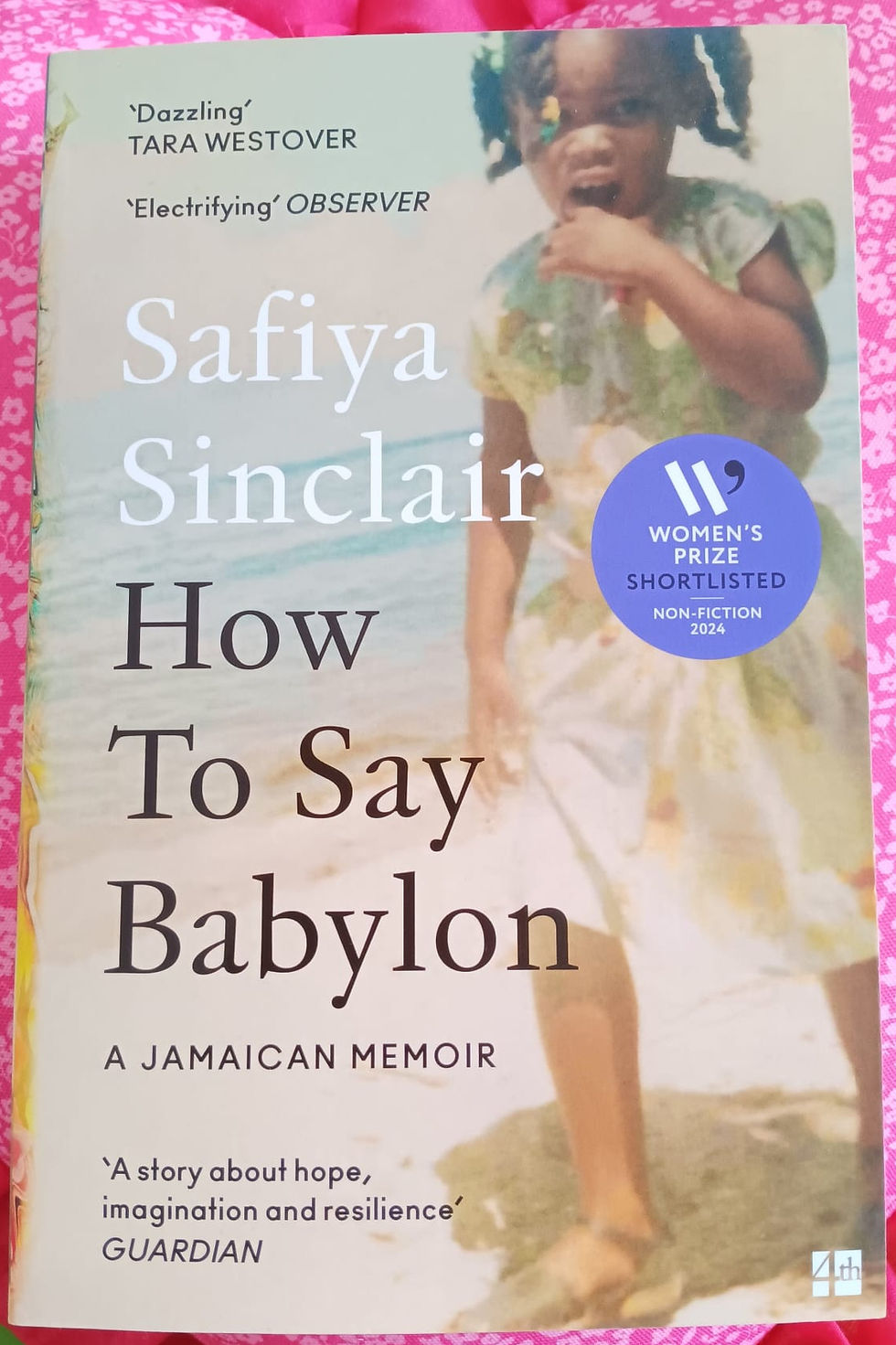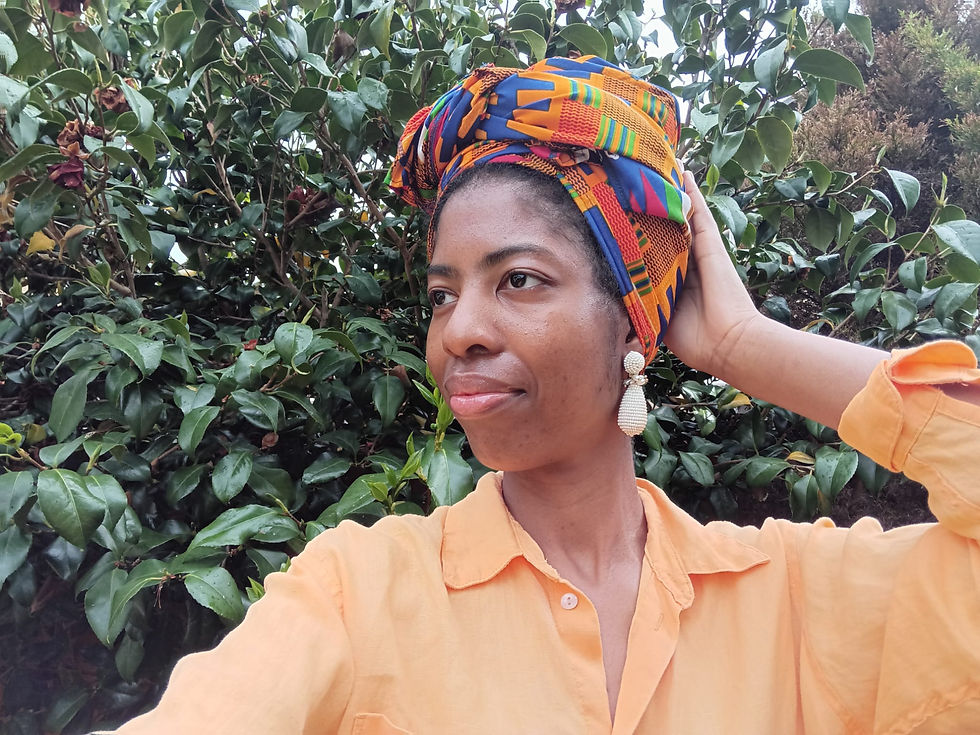BOOK REVIEW: Yinka, where is your huzband? by Lizzie Damilola Blackburn.
- booksandjoyfulness
- Mar 23
- 7 min read

‘The midnight sky is just as beautiful as the sunrise’ – Yinka’s Dad (p76)
“Do not remove the kinks from your hair – remove them from your brain.” ― Marcus Mosiah Garvey
March is Women’s History Month. This book review will be posted in the month of International Women’s Day and I couldn’t think of a more fitting book to review for this time.
Topics Covered in this Book Review:
- Structure
- Colourism, Texturism and Body Image
- Research on Harmful Hair Products for Black People (including synthetic braids)
- The Black Hair Shop Experience
I have so much to say about this outstanding novel and about dear Yinka, the main protagonist of the excellent novel, ‘Yinka, where is your husband?’ by the author Lizzie Damilola Blackburn. I found myself really rooting for Yinka. Sometimes, I cringed at her decisions and felt frustrated with some of her very relatable and human choices, however I found myself rooting for her all the way and feeling very moved and cheering for her as she made positive steps forward towards self-love. At many points in this novel, I felt that love and societal respect from parents and aunties was conditional. It was as if true love and respect from some family members was only deserved and granted if a millennial fulfilled the terms and conditions of social expectations – namely marriage. I was happy that as the novel progressed, Yinka learned to love herself whilst still maintaining her desire for romantic love and partnership/marriage.
Lizzie Damilola Blackburn has written an honest, heartening and genuine account of the experience of a British-Nigerian woman grappling with social pressure and self-acceptance. The authenticity of this novel clearly shines through as the research undertaken by the author is evident when perusing the acknowledgments section at the back of this novel. We learn that a mock counselling session was organised (presumably to give authenticity to Yinka’s experience of counselling) and that a beta-read report was organised to ensure cultural accuracy.
Yinka is a character who will remain in my heart for a long time because she could be so many of us as Black Women. Yinka reminds me to some extent of Queenie, the main protagonist of the wonderful novel ‘Queenie’ by Candice-Carty Williams who learns important lessons about self-love and forgiveness. Maybe some of us are or have been Yinka or have family members or friends who remind us of Yinka. In my view, Yinka is a composite of not only the experience of colourism of many Black Women in the UK, but of the experiences of dark-skinned Black Women across the diaspora.
Yes, this is a novel predominantly about marriage pressure, family issues, cultural and social pressure with commentary on gentrification and exploitation in some churches regarding the prosperity gospel and tithing. However, this is fundamentally a novel about the devastating impact of racism, specifically in the form of colourism and texturism, on the psyche of the Black Woman. Yinka clearly struggles deeply with self-esteem particularly stemming from not feeling beautiful due to her skin tone, hair and body type and this is evident at many points in this novel. I want to focus my review predominantly on the issues of colourism, texturism and body image.
Notes on structure:
This novel is written in chronological order and is an account of Yinka’s life in the months running up to her cousin’s wedding in July and is told in first-person narrative. This first-person narrative puts the reader in Yinka’s shoes, heightening empathy for Yinka and her marriage dilemma. Through this narrative, we are allowed direct entry into Yinka’s mind, thoughts and reactions, heightening the reader’s empathy for Yinka.
Chapters often begin with or are peppered with personal written or typed snapshots into Yinka’s life such as text messages between Yinka, friends and family; emails; Samsung memos or Yinka’s google searches. One chapter even includes a bill from a hair shop which I thought was novel and added to the intimacy created between writer and reader. A shopping bill can serve as quite important data and insight into someone’s personal life and habits.
Through these structural snapshots, we learn about Yinka’s personal relationships, thoughts, plans, habits and self-esteem.
Colourism, Texturism and Body Image:
Lizzie Damilola Blackburn writes about colourism, texturism and body image with sensitivity and care through Yinka’s character and the characters around her. I really wanted to give Yinka a hug and speak sense into her at multiple points in this novel as I felt that she was buckling under the relentless and incessant marriage pressure. I was heartened that Yinka does indeed learn to love herself as the novel progresses. I was glad that Nana (her best friend) spoke sense into Yinka and urged her to know her worth. Whilst reading, I underlined quotes and scribbled furious annotations on many pages. I have made note of multiple pages with quotes that sadly showcase Yinka’s low self-esteem, but I will only share a few.
“How could you think someone as hot as Alex could like someone as dark and skinny as you? You don’t stand a chance.” (Yinka’s inner voice p 131.)
On page 140, as part of Yinka’s written plan for ‘Operation Wedding Date’, (a plan to win the affections of a man named Alex who has recently moved to London), under the column entitled ‘Tasks’, Yinka writes “Buy a weave (preferably a long weave)”. Why does she feel her own hair is not lovely enough to impress and attract a man?
“I ponder which way to swipe. Marcus is white. What would he make of my kinky hair and dark lips and chocolate skin?” (p 296.)
After Yinka changes her hairstyle, Yinka’s Mum (p 189) says ‘This is better,’… ‘This is much, much better. Now you are beautiful again.’ A lifetime wouldn’t be enough to analyse and explain the depth of how problematic this statement is. I include this quote not to demonise Yinka’s Mother, but to show the enduring legacy of biased ideas on the psyche of generations of Black Women and Black people generally. Yinka’s Mother’s statement shows how these ideas are reinforced and passed down through generations.
Page 331 shows the impact of these ideas on Black Men as a man Yinka speaks to on the phone cruelly says, ‘It’s just my preference.’… ‘But you’re pretty for a dark-skinned girl, though-’ I won’t even waste my breath expounding upon why this is problematic either.
Yinka says, ‘I just hope he doesn’t notice my flat bum…’ (p 84) and uses letters from the alphabet to codify bum types with a letter ‘D’ bum appearing to be the most desirable.
Lizzie Damilola Blackburn’s portrayal of Yinka through Yinka’s almost constant self-criticism shows the legacy of Eurocentric beauty standards on her perception of Self.
Yinka’s dark skin, afro hair and body type are beautiful but what adds to her beauty is her kindness. Yinka truly has a heart for helping people. Her inner beauty is evident when she speaks of volunteering and says ‘There’s something about helping people that’s good for the soul.’ (p 154) Yinka clearly also has a gift for talking and connecting with people (p 303). Apart from her physical beauty, what makes Yinka beautiful is her capacity for kindness and empathy – qualities that are essential in making a marriage (or any relationship) work.
Kanekalon Hair and other hair products:
The pressure to conform has arguably led many Black Women to use products that are or may be extremely harmful to our health.
Yinka gets a weave installed and the hair used is Kanekalon hair (p 174).
Dr Phillip Gould explains in a March 4 2025 article on blackdoctor.org about cancer causing toxins found in popular hair braids that this type of synthetic hair contains compounds that are ‘toxic to humans’(para 7). ‘Ten popular synthetic braiding hair products were tested[.]’ (para 3.)
We are made aware that ‘James Rogers, Director of Product Safety at Consumer Reports [who] led CR’s synthetic hair testing, says testing found lead in 90 percent of the products’ (para 8) and that ‘According to Rogers, most synthetic braiding hair lacks ingredient disclosure’ (para 10). The devastating risks of hair relaxers are also discussed and explained.
Other products are tested and the findings can be seen in the Consumer Report tests here.
Chrystal G. Thomas further outlines and explains health risks of hair products, namely synthetic extensions in the May 2023 article entitled Carcinogenic materials in synthetic braids: an unrecognized risk of hair products for Black women.
Karen Feldscher on the Harvard Chan School – School of Public Health webpage writes about hair products aimed at Black Women where it is stated ‘chemicals in hair relaxers...and other hair products marketed to Black girls and women contain ‘endocrine-disrupting substances linked with early menstruation, reproductive health issues, and cancer’ (para 1).
It is important to note that the effects of synthetic hair braiding is a developing area of research and the veracity of findings of the Consumer Reports testing have been criticised/disputed, particularly by some mentioned hair brands tested. In a March 10th dated article entitled ‘What’s in Your Hair? Experts Weigh in on the Next Steps for Safer Products’ by Jasmine Smith, Associate Editor at blackdoctor.org, James Rogers is interviewed and says ‘I’ll freely admit that we only tested 10 different brands out of a possible 4,000. So, we know we’re just scratching the surface. We need more data and information about these products.’
Still, current evidence is clear on the risks of many hair products aimed at Black people. Yinka, and all real-life Black people need hair products that are good for our health, not hair products that will harm us.
I hope to see further research done regarding products that are sold specifically to Black people in the UK. I have found the Environmental Working Group website to be helpful for looking at hazard levels of products.
The Black Hair Shop Experience:
I additionally want to note that Lizzie Damilola Blackburn writes accurately about the experiences of many Black Women in hair shops that are not Black owned. These shops are portrayed as a deeply psychologically damaging and exploitative place for Black Women where we are made to feel extremely uncomfortable and where products are available that can reinforce ideas that the way we look is not beautiful e.g. skin lightening creams (p 145, 146.)
Small note – On page 146, it would have been preferable for the language used by the woman wearing leggings and gold earrings to be called ‘Jamaican Creole’ as this is the linguistically approved term for the Jamaican language.
Conclusion:
This well-written novel was a beautiful joy to read. Yinka is a lovable, beautiful and relatable character and Lizzie Damilola Blackburn has triumphed in her searingly accurate first-person narrative portrayal of a millennial Black Woman in the UK managing social (particularly marriage) pressure and learning to love herself for who she is outside of being married. Lizzie Damilola Blackburn is a writer with great talent, and I look forward to reading her next novel, ‘The Re-Write.’ I hope that everyone, particularly Black Women will read this novel and feel affirmed and empowered. It is important to always remember the undeniable and inexorable truth that as Yinka’s father says, ‘the midnight sky is just as beautiful as the sunrise.’
You can purchase my debut novel, Sciliconia on Amazon.
© 23rd March 2025 by Afia Nicholas.




Comments